#Odi Barbare
Explore tagged Tumblr posts
Text
Tedio invernale: l'intenso lamento di Giosuè Carducci sulla perdita del passato. Recensione di Alessandria today
Un canto malinconico tra memoria e desolazione
Un canto malinconico tra memoria e desolazione. “Tedio invernale”, poesia di Giosuè Carducci, è un’opera che riflette il profondo senso di disillusione e malinconia di fronte alla percezione di un passato glorioso ormai irrecuperabile. Carducci, con la sua abilità lirica, dipinge un quadro emotivo intenso, in cui il contrasto tra il ricordo di tempi luminosi e la cruda realtà presente genera un…
#Alessandria today#Arte poetica#Bellezza#classicismo#classicismo e modernità#classicismo italiano#critica sociale#Decadenza#decadenza moderna#disillusione#epoche perdute#Giosuè Carducci#Giosuè Carducci biografia#Google News#italianewsmedia.com#letteratura italiana#letteratura universale#linguaggio elevato#Lirica#Malinconia#malinconia invernale#metafore poetiche#Mito#Natura#Nebbia#nostalgia#Odi barbare#Omero#passato glorioso#Pier Carlo Lava
0 notes
Text

“― O tu che pasci i buoi presso Mevania caliginosa,
e tu che i proni colli ari a la sponda del Nar sinistra, e tu che i boschi abbatti sopra Spoleto verdi o ne la marzia Todi fai nozze,
lascia il bue grasso tra le canne, lascia il torel fulvo a mezzo solco, lascia ne l’inclinata quercia il cuneo, lascia la sposa a l’ara;
e corri, corri, corri! con la scure corri e co’ dardi, con la clava e l’asta! corri! minaccia gl’itali penati Ànnibal diro. ―
Deh come rise d’alma luce il sole per questa chiostra di bei monti, quando urlanti vide e ruinanti in fuga l’alta Spoleto
i Mauri immani e i numidi cavalli con mischia oscena, e sovra loro, nembi di ferro, flutti d’olio ardente, e i canti de la vittoria!”.
(Giosuè Carducci - Odi barbare (1877) - Libro I - Alle fonti del Clitumno - 55 - 76)
1 note
·
View note
Text
As you may have seen @katerinaaqu and I have been discussing about a head canon of hers, tatted Odysseus.
For a while we searched for Scythian tattoos as they are the closest society that allowed tattoos, we weren´t sure if in Mykenean Greece they were frowned upon but in classical Greece they were (criminals, shady or barbaric people wore them).
So to make it plausible we came up with this idea: in the middle of the Troyan war in a resupply day, Menelaus and Agamemnon find Odysseus been tattooed an olive tree by a Scythian, perplexed by this they told him that it was a nothing a king should do, shady look.
But Odysseus told them it was a memory of his home of Penelope and Telamachus, that at least if he died there it would have died with his family. Also is a display of Ody´s more flamboyant personality traits, he didn´t tattoed a small olive or branch, nonono, he tattoed a whole tree!.
As the real design is composed of branches inspired by Scythians tattoos of deer´s antlers, (the lack of trees in the steppes prevented them from forming a more floral and plant style; being deer's antlers where we find more plant 'like designs),

The olive flowers are simplifications of the actual flower,
Flowers for my beautiful wife, whom I longed for, for years
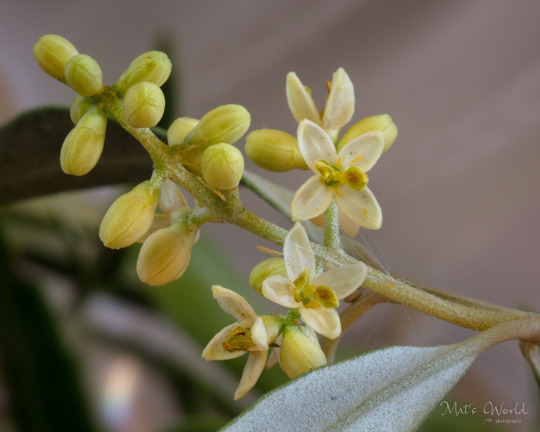
The leaves are blackouts of the originals and the olives are also simplifications.
The sweet fruit of my dear Telemachus whom I never saw growing
The images below are the sketches I made for having an idea of the placement and elements we wanted to include.
We chose the upper arm as it was more concealable and only be fully revealed to Penelope.
As you can see there´s a swallow drawing, it has it reasons, swallows (Hirundo rustica) have a year migration and came back to Europe and Greece in spring, being heralds of the season and all that entails (hope, regrowth, fertility...) but the most important attributes for us were; (Athena transforms into a swallow and flies away from Telemachus in the Odyssey). Also it is mentioned that the chord of Odysseus's bow "sang like a swallow" when he used it to kill the suitors symbolizing his homecoming.
Swallows have always been linked to journeys specially to homecoming. They idea was of one swallow (Odysseus) but swallows are paired and as a small reminder, the biggest and most ornate is Penelope, fully in flight and more artistically and Odysseus is the one below more naturalistic as he is lesser in his eyes than her. The swallows are more linear and not painted as it also seems more secretive and blank spaces for everyone except him (So he can say everything I have been writing to her)
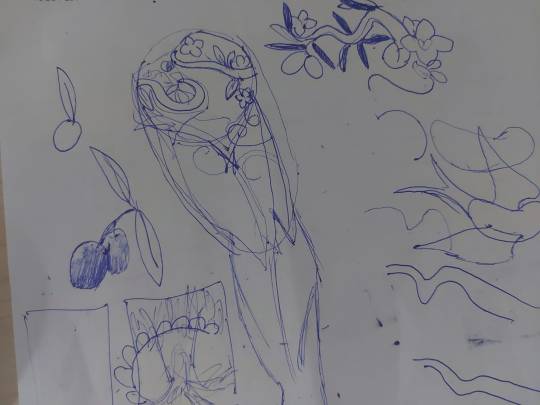
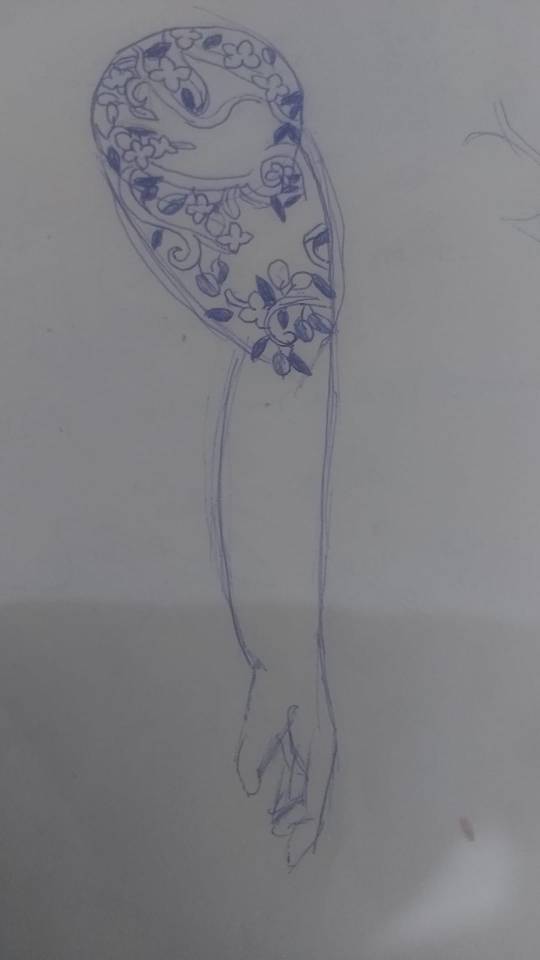
These is the final rendition of the idea!
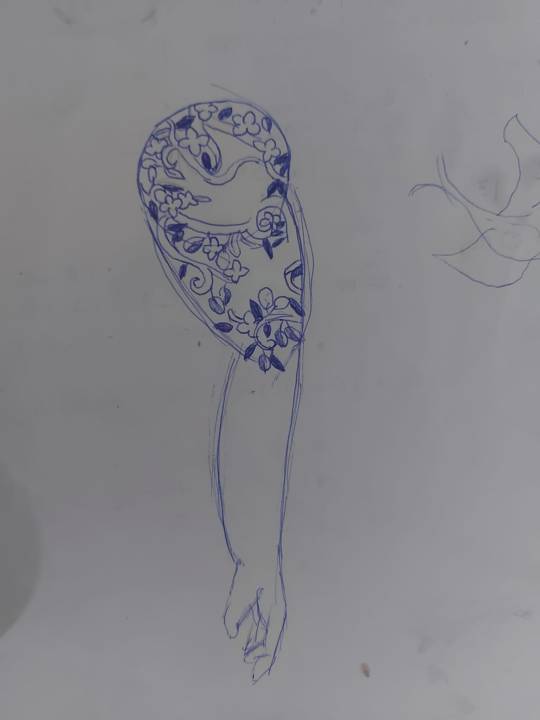
I hope you have enjoyed and that it becomes your new headcanon!
@katerinaaqu thank you so much for everything! It has been a pleasure!
#@katerinaaqu#@aaronofithaca05#headcanons#olive tattoo#olive#flowers#branches#inspired Scythian tattoo#greek mythology#odysseus#the odyssey#homer#swallows#tattoos with meaning#sketches#aaron´s doodles#penelope#telemachus#odysseus x penelope#odysseus the sailor#odysseus the master mariner
38 notes
·
View notes
Note
I've tried writing poetry more than once, but I keep getting stuck on this: I write verses for songs that don't exist instead
I can't sing, so embracing it is out of the question, so how do I make poetry feel just as poignant when whover doesn't have the music in my brain reads it?
oh i get this ALL the time like you wouldn't believe how often. so many songs i have written started out as poems and vice versa so many poems were originally song ideas (i reckon this is at least partly because i like to write in fixed meter and song verses are by definition fixed meters).
what i like to do, since im also a singer, is take it in whatever direction the text leads me and make songs out of my more musical poems — perfectly fair if this isn't your cup of tea of course, but songwriting without singing is also a very valuable art, and if you play an instrument you can write an accompanying melody and see if anyone's interested in singing it (or even sing it yourself for a quick demo, i promise you bad singing with amazing songwriting is nothing new and there are so many people who value lyrics or melodies over technical vocal prowess).
if you're adamant about not wanting to write songs, which is super fair, you can probably try your hand at more rigid meters which have fixed accents and a more musical quality to them: i take a lot of inspiration from ancient greek and latin meter, you could try following them or similar fixed-accent meters exactly. you would have to make sure the correspondence isn't too off between the original type of accent and your language's type of accent, which can be a bit of a pain, but luckily writing modern language poetry with ancient language meters is nothing new, and you can often find examples of poems from the past handful of centuries trying to adapt these forms into their own languages (at least in italian it's like this — and if you're italian i would recommend you check out what carducci does with the odi barbare, it's very interesting metrically if not thematically)! and obviously, once you have your meter of choice down, you can just say which one it is and anyone who has any familiarity with the meter will know how to read it.
at the end of the day, though, nobody is inside your head like you are, and you always risk something not coming across like you intended — be it the metrics of a verse or the meaning of an expression you used. there's a lot of poems i have scrapped because they didn't sound right to others who heard them differently to how i did in my head, and others i have posted regardless of how someone else might read them differently, simply because i liked them too much to let that dissuade me, and others yet which i have posted as poems but i could hear a melody for while composing them and just couldn't be assed to record them or make them song-length. i cannot for the life of me remember who originally said this because i am a hack, but i am very fond of the theory of art according to which art is the intersection between the author, the work itself and the people who experience it: the melody you have in your mind is part of the poetry itself, but so is a potential reader's "misunderstanding" and reinterpretation of it, those elements aren't necessarily in competition but they come together to create a meaningful artistic experience that exists in the world as opposed to just in your head.
2 notes
·
View notes
Photo




Giosuè Carducci, Odi Barbare, "Dinanzi alle terme di Caracalla"
Corron tra 'l Celio fosche e l'Aventino le nubi: il vento dal pian tristo move umido: in fondo stanno i monti albani bianchi di nevi. A le cineree trecce alzato il velo verde, nel libro una britanna cerca queste minacce di romane mura al cielo e al tempo. Continui, densi, neri, crocidanti versansi i corvi come fluttuando contro i due muri ch'a più ardua sfida levansi enormi. "Vecchi giganti" par che insista irato l'augure stormo "a che tentate il cielo? " Grave per l'aure vien da Laterano suon di campane. Ed un ciociaro, nel mantello avvolto, grave fischiando tra la folta barba, passa e non guarda. Febbre, io qui t'invoco, nume presente. Se ti fûr cari i grandi occhi piangenti e de le madri le protese braccia te deprecanti, o dea, da 'l reclinato capo de i figli: se ti fu cara su 'l Palazio eccelso l'ara vetusta (ancor lambiva il Tebro l'evandrio colle, e veleggiando a sera tra 'l Campidoglio e l'Aventino il reduce quirite guardava in alto la città quadrata dal sole arrisa, e mormorava un lento saturnio carme); Febbre, m'ascolta. Gli uomini novelli quinci respingi e lor picciole cose: religïoso è questo orror: la dea Roma qui dorme. Poggiata il capo al Palatino augusto, tra 'l Celio aperte e l'Aventin le braccia, per la Capena i forti omeri stende a l'Appia via.
#roma#rome#poesia#poet#poetry#italian poetry#italian literature#literature#letteratura#letteratura italiana#italy#roman#caracalla#terme#therme#odi barbare#odi#barbare#barbaric#carducci#giosuè carducci#book#book therapy#library#religion#vatican#campidoglio#landscape
0 notes
Quote
Meglio a chi 'l senso smarrì de l'essere, meglio quest'ombra, questa caligine: io voglio io voglio adagiarmi in un tedio che duri infinito.
G. Carducci, Alla stazione in una mattina d'autunno (Odi barbare)
9 notes
·
View notes
Note
Hi! Your blog is my favorite place on the internet. Do you happen to have any quotes or lines about lovers and, like, loyalty? Like loyalty over ethics? Choosing each other over the world? Thank you <3
"I heard about a man and a woman who lived in Petrograd in 1917. These two were so in love with each other that they didn’t even notice the Revolution."
Boris Pasternak, quoted by Alexander Gladkov in 1941 (in Gladkov's memoirs about Vsevolod Meyerhold and his encounters with Pasternak -- thank you @fatallist !)
"The blood flood is the flood of love, / The absolute sacrifice. / It means: no more idols but me, / Me and you."
Sylvia Plath, “The Munich Mannequins”
"Now I see that love is selfish. It makes you a country of two. At war with the rest of the world.”
Henrik Ibsen, Rosmersholm

Mary Shelley, Frankenstein
“She’s kept her love for him as alive as the summer they first met. In order to do this, she’s turned life away. Sometimes she subsists for days on water and air. Being the only known complex life-form to do this, she should have a species named after her. Once Uncle Julian told me how the sculptor and painter Alberto Giacometti said that sometimes just to paint a head you have to give up the whole figure. To paint a leaf, you have to sacrifice the whole landscape. It might seem like you’re limiting yourself at first, but after a while you realize that having a quarter-of-an-inch of something you have a better chance of holding on to a certain feeling of the universe than if you pretended to be doing the whole sky.
My mother did not choose a leaf or a head. She chose my father, and to hold on to a certain feeling, she sacrificed the world.”
Nicole Krauss, The History of Love
"Without you, life is entirely feasible but hateful."
Katie Ward, Girl Reading

Elisabeth Hewer, “Dove Hands”
“I have been astonished that Men could die Martyrs for religion – I have shudder’d at it – I shudder no more – I could be martyr’d for my Religion – Love is my religion – I could die for that – I could die for you.”
John Keats, letter to Fanny Brawne
“I love you with a love that reaches you on the other shore. That dark, unknown shore where, in order to follow you, my love stumbles forth blindly, bleeding, but always holding you tight.”
Dulce María Loynaz, “Poem XCI”
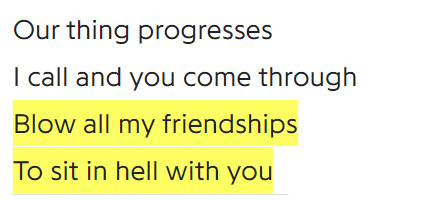
Lorde, “The Louvre”
“I really like the idea of love as a violent act—not to the person that you love, but against the world. To say to somebody, ‘I love you; by extension, I hate all other things.”
Hozier, from an interview
“O I willingly stake all for you, / O let me be lost if it must be so! / O you and I! what is it to us what the rest / do or think? / What is all else to us? only that we enjoy / each other and exhaust each other if / it must be so”
Walt Whitman, “From Pent-Up Aching Rivers”
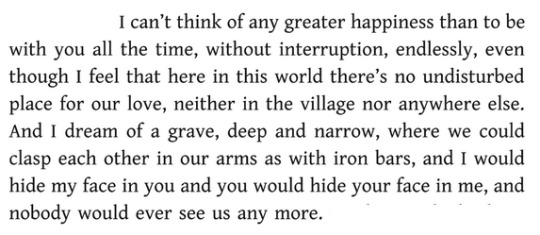
Franz Kafka, The Castle

Geoffrey Hill, from Odi Barbare
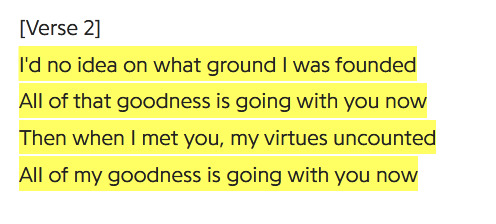
Hozier, “Shrike”
#if anyone knows the source from that pasternak please let me know i've been looking forever#ask#anonymous#quotes about x#a country of two
1K notes
·
View notes
Text

[...] Plumbeo / il cielo e il mattino d'autunno / come un grande fantasma n'è intorno.
Giosuè Carducci from Odi Barbare (1877–89)
#giosuè carducci#bibliophile#italian literature#italian poets#italian poetry#literature#poetry#quotes
27 notes
·
View notes
Quote
Rompendo il sole tra i nuvoli bianchi a l'azzurro sorride e chiama — O primavera, vieni!
Giosuè Carducci, da Odi barbare
35 notes
·
View notes
Text
GIOSUE CARDUCCI

Buonasera miei cari Lettori e Lettrici, torno a parlarvi degli autori italiani e stranieri. Vi ricordate il post sulla Scapigliatura e il Verismo? No? E allora lo potete andare a leggere di nuovo qui . Andiamo a vedere insieme il poeta di qui vi parlerò stasera. Vi ricordo che le immagini le prendo da Google Immagine a meno così nessuno avrà da ridire qualcosa ;) Giosue Carducci nasce nel 1835 a…
View On WordPress
#Giambi ed Epodi#Giosue Carducci#Italiano#La poetica e lo stile#Le Prose#Le raccolte giovanili#Odi Barbare#Poeti#Rime e Ritmi#Rime Nuove#Scapigliatura#Verismo#vita
0 notes
Quote
you very last, only flower of my useless life
GIOSUÈ CARDUCCI, from “Odi Barbare”(1877–89) In: “A selection of modern Italian poetry in translation”, translated by Roberta L. Payne.
9 notes
·
View notes
Text
"O Miramare, a le tue bianche torri
attediate per lo ciel piovorno
fósche con volo di sinistri augelli
vengon le nubi.
O Miramare, contro i tuoi graniti
grige dal torvo pelago salendo
con un rimbrotto d'anime crucciose
battono l'onde.
Meste ne l'ombra de le nubi a' golfi
stanno guardando le città turrite,
Muggia e Pirano ed Egida e Parenzo,
gemme del mare;
e tutte il mare spinge le mugghianti
collere a questo bastion di scogli
onde t'affacci a le due viste d'Adria,
rocca d'Absburgo;
e tona il cielo a Nabresina lungo
la ferrugigna costa, e di baleni
Trieste in fondo coronata il capo
leva tra' nembi.
Deh come tutto sorridea quel dolce
mattin d'aprile, quando usciva il biondo
imperatore, con la bella donna,
a navigare!
A lui dal volto placida raggiava
la maschia possa de l'impero: l'occhio
de la sua donna cerulo e superbo
iva su 'l mare.
Addio, castello pe' felici giorni
nido d'amore costruito in vano!
Altra su gli ermi oceani rapisce
aura gli sposi.
Lascian le sale con accesa speme
istoriate di trionfi e incise
di sapïenza. Dante e Goethe al sire
parlano in vano
da le animose tavole: una sfinge
l'attrae con vista mobile su l'onde:
ei cede, e lascia aperto a mezzo il libro
del romanziero.
Oh non d'amore e d'avventura il canto
fia che l'accolga e suono di chitarre
là ne la Spagna de gli Aztechi! Quale
lunga su l'aure
vien da la trista punta di Salvore
nenia tra 'l roco piangere de' flutti?
Cantano i morti veneti o le vecchie
fate istrïane?
Ahi! mal tu sali sopra il mare nostro,
figlio d'Absburgo, la fatal Novara.
Teco l'Erinni sale oscura e al vento
apre la vela.
Vedi la sfinge tramutar sembiante
a te d'avanti perfida arretrando!
È il viso bianco di Giovanna pazza
contro tua moglie.
È il teschio mózzo contro te ghignante
d'Antonïetta. Con i putridi occhi
in te fermati è l'irta faccia gialla
di Montezuma.
Tra i boschi immani d'agavi non mai
mobili ad aura di benigno vento,
sta ne la sua piramide, vampante
livide fiamme
per la tenèbra tropicale, il dio
Huitzilopotli, che il tuo sangue fiuta,
e navigando il pelago co 'l guardo
ulula - Vieni.
Quant'è che aspetto! La ferocia bianca
strussemi il regno ed i miei templi infranse:
vieni, devota vittima, o nepote
di Carlo quinto.
Non io gl'infami avoli tuoi di tabe
marcenti o arsi di regal furore;
te io voleva, io colgo te, rinato
fiore d'Absburgo;
e a la grand'alma di Guatimozino
regnante sotto il padiglion del sole
ti mando inferia, o puro, o forte, o bello
Massimiliano. "
- Giosuè Carducci, Odi Barbare

9 notes
·
View notes
Text
Pakistan In High Scoring First Tour Win
1st T20 International - England vs Pakistan - Nottingham
Pakistan took sweet revenge for their defeats in the ODI series, as they beat England by 31 runs in the first of three T20s in Nottingham on Friday after posting a mammoth total of 232 and restricting the home team to 201.

Pakistan's opening pair of Mohammad Rizwan (63) and Babar Azam (85) set the victory course, as they lavishly starred in a bludgeoning 150-run stand for the first wicket in only 14.4 overs, after England captain Eoin Morgan won the toss and elected to field.
Both batsmen hammered eight fours each but Barbar was the more aggressive of the two as he struck three sixes while Rizwan hit one ball out of the park.
England used up six bowlers, David Willey, Tom Curran, Liam Livingstone, Saqib Mahmood, Lewis Gregory and Matt Parkinson who all came under a heavy peppering with five of them conceding over 11 runs an over.
England could not get off to a desired start in the run chase as wickets fell at regular intervals with Livingstone giving them some hope of catching up with the required rate, as he desperately struck nine sixes and six fours in making 103 in just 43 balls.
Livingstone incidentally went on to record the fastest century in T20 Internationals for England, when he got to the mark off 42 balls eclipsing D.Malan who got there off 48 balls.
When he fell with the total at 183, the seventh to be dismissed in the 17th over, England's hopes diminished further, as they never appeared to recover from losing the wickets of Dawid Malan (1), Jason Roy (32), Jonny Bairstow (11) and Moeen Ali (1) with 82 runs on the board in 6.4 overs.
Scores: Pakistan 232 for 6 in 20 (Mohammad Rizwan 63, Azar Babar 85, Tom Curran 2 for 47) England 201 in 19.2 overs (Liam Livingstone 103, Shaheen Afridi 3 for 30, Shadab Khan 3 for 52)
#cricket#cricket on the go#pakistan tour of england 2021#pakistan#england#pak vs eng#eng vs pak#sports#sports news#sports on the go
0 notes
Quote
Oh qual caduta di foglie, gelida, continua, muta, greve, su l'anima! io credo che solo, che eterno, che per tutto nel mondo è novembre.
Giosuè Carducci, Odi barbare
18 notes
·
View notes
Photo

«Rompendo il sole tra i nuvoli bianchi a l'azzurro sorride e chiama — O primavera, vieni! —» ✒️Giosuè #Carducci, Odi Barbare, Libro II, Vere novo ⠀⠀ Nell'immaginario collettivo la #primavera è la #stagione della #rinascita. Il suo aspetto richiama colori caldi, che suonano come un preludio all'estate. ⠀⠀ Legate a questa meravigliosa #stagione, vi sono numerose #leggende, alcune molto antiche. #Mitologia, #folclore, filosofia, simbolismo e riti antichi si incontrano in questo momento di risveglio. ⠀⠀ La più antica festa di Primavera pare essere Sham El Nessim, le cui tracce risalgono a circa 4700 anni fa. Sham el Nessim, letteralmente «fiutare il vento», che in #Egitto segna l’inizio della primavera, cade il primo lunedì dopo la Pasqua copta. In epoca Faraonica essa era una ricorrenza legata all’agricoltura, i cui riti di #fertilità furono inglobati dal Cristianesimo nei riti Pasquali. ⠀⠀ Ancora oggi la festa è celebrata seguendo l’antica simbologia: le strade e i prati delle città Egizie si riempiono di gente, e si fanno picnic all’aria aperta per respirare la brezza primaverile. ⠀⠀ Anche i cibi consumati seguono per simbologia le offerte citate da #Plutarco: le #uova si confermano simbolo universale della rinascita e del Cosmo. L’usanza di appendere uova dipinte risale, in Egitto, all’epoca delle piramidi, ma ancora oggi uova dipinte sono appese nei templi come simbolo della #rigenerazione della Vita e dell’Universo. ⠀⠀ Anticamente le uova simboleggiavano la mitica #Fenice, che deponeva ed era al tempo stesso l’uovo cosmico. Secondo la leggenda, l’Uccello di fuoco prima di morire preparava un nido in forma d’uovo, poi si adagiava al centro lasciandosi incenerire dai raggi del sole. Dalle ceneri nasceva quindi l’uovo dal quale la Fenice riprendeva vita. La Fenice è la Vita stessa e, allo stesso tempo, è il Cosmo nel quale essa porta la Vita, per questo genera l’uovo dal quale nascerà, così come la Natura genera sé stessa all’infinito. 🔺 fonte: libreriamo 🔺 ⠀⠀ ⠀⠀ ⠀⠀ ⠀⠀ ⠀⠀ ⠀⠀ 🏷 — Tag lists —⠀⠀⠀⠀⠀⠀⠀⠀⠀⠀⠀⠀⠀⠀⠀⠀⠀⠀⠀ #maxbene_post #maxbene_nature #blogpost #bloggerlife #ariadiprimavera #savetheearth #savetheplanet #savenature #natureprotection ▫️— https://www.instagram.com/p/BwMvVw0lCXi/?utm_source=ig_tumblr_share&igshid=1hn5k49qcicha
#carducci#primavera#stagione#rinascita#leggende#mitologia#folclore#egitto#fertilità#plutarco#uova#rigenerazione#fenice#maxbene_post#maxbene_nature#blogpost#bloggerlife#ariadiprimavera#savetheearth#savetheplanet#savenature#natureprotection
0 notes